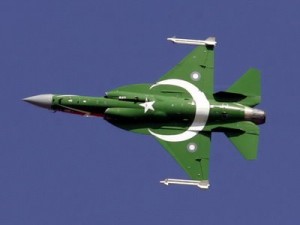2014-12-03 by defenceWeb
Nigeria, long targeted as a potential customer for the Chinese/Pakistani JF-17 Thunder jet, is close to ordering one or two squadrons, according to reports from Pakistan.
IHS Jane’s Defence Weekly quoted a senior Pakistani Ministry of Defence official at the IDEAS 2014 exhibition in Pakistan as saying that Nigeria was close to signing a contract for the jets and that the Nigerian Air Force (NAF) has finalised its recommendations for the acquisition of 25-40 aircraft.
This comes after NAF chief Air Aarshal Adesola Nunayon Amosu visited Pakistan in October, where he toured the Pakistan Aeronautical Complex (PAC) facility where the JF-17 is manufactured. Pakistan also offered Nigeria tanks, armoured personnel carriers, radio equipment and night vision equipment.
At the IDEAS 2014 exhibition, Pakistan’s Air Chief Marshal Tahir Rafique Butt said that Nigeria had expressed interest in the JF-17, reports Army Recognition.

In March this year Pakistani and Nigerian defence officials met and discussed defence opportunities. In addition to the JF-17, Nigeria has previously shown interest in acquiring Al-Zarrar main battle tanks, Kaan 33 fast attack craft and small arms.
Nigeria and Pakistan enjoy good defence relations, with Pakistan training Nigerian officers. Nigeria’s High Commissioner to Pakistan, Malam Dauda Danladi, recently said that 120 officers attended various courses in Pakistan, with 40 currently undergoing training this year.
The JF-17 is jointly produced by the Chengdu Aircraft Industries Corporation (CAC) of China and the Pakistan Air Force and Pakistan Aeronautical Complex (PAC).
The Pakistan Air Force has 50 in service and has been flying the type since 2007, although only officially inducting the aircraft in 2010. Pakistan may acquire up to 200.Pakistan and China have also been promoting the JF-17 to various countries, such as Bangladesh, Myanmar, the Democratic Republic of Congo, Sri Lanka, Sudan, Venezuela and Turkey.Last month PAF Air Commodore Khalid Mahmood, head of JF-17 sales and marketing, said Pakistan and China were in advanced talks with ten countries to sell the JF-17. A Middle Eastern country was expected to be the first foreign client.
The FC-1 Xialong/JF-17 Thunder programme was launched in 1991 after the United States cancelled development of the Chengdu Super-7 following the 1989 Tianamen Square incident. Collaboration with Pakistan began in 1995, leading to a joint development contract in June 1999. The aircraft first flew in August 2003 and the first JF-17 squadron was inducted into the Pakistan Air Force in February 2010.
The aircraft has a design service life of 4 000 flight hours or 25 years. It can carry up to 3 600 kg (8 000 lb) of ordnance in addition to its twin-barrel 23 mm cannon. It is powered by a Russian RD-93 turbofan, a variant of the RD-33 used on the MiG-29. However, China is developing the more reliable and powerful WS-13 engine to replace the RD-93. A glass cockpit features an electronic flight instrument system with wide-angle head-up display and three colour multifunction displays.
In addition to JF-17s, the Nigerian Air Force has expressed interest in buying a squadron of Textron AirLand scorpion jets. Last month Air Vice Marshal Rufus A Ojuawo, the director of operations for the Nigerian Air Force, said the NAF wants and needs the Scorpion and that a formal request to buy could be made soon.
The NAF uses seven Mi-24 attack helicopters for counter-insurgency operations as well as 11 F-7 fighter jets, 21 L-39ZA Albatros, 12 MB-339 and 12 Alpha Jet trainer/light attack aircraft. However, the majority of these aircraft are several decades old and have been worn down by attrition. The F-7s are unable to carry precision guided air to surface weapons while the country’s ATR 72 surveillance aircraft are able to detect insurgent activity but not deploy weapons.
Ojuawo told IHS Jane’s Defence Weekly that the Air Force has obsolete equipment with low serviceability rates and that it needs a rapid response capability with concentrated firepower. He added that the NAF would shortly argue the Scorpion’s case with the government in the hope of initially buying a squadron’s worth of aircraft and possibly more in the future.
Republished with permission of our partner defenceWeb.

